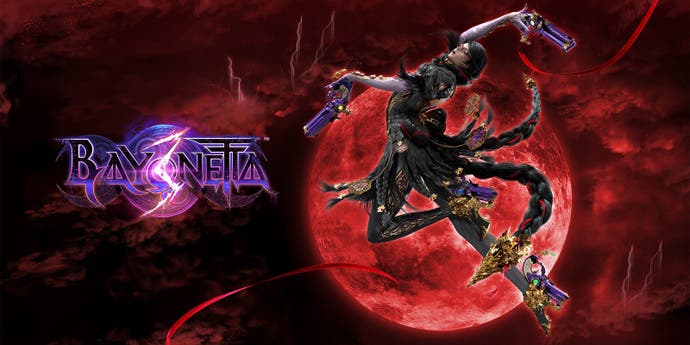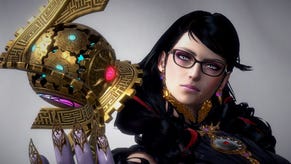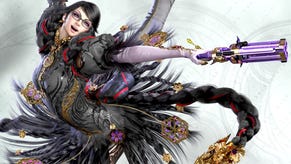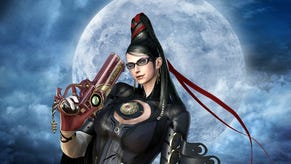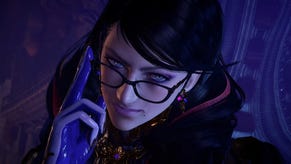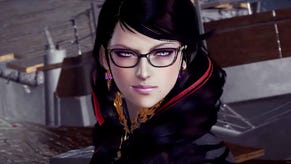Scalebound lives on in Bayonetta 3's best new trick
Monster mash.
Ever since it sprung from the remnants of Capcom's Clover Studios back in 2007, PlatinumGames has become synonymous with a certain brand of over-the-top action; think the knee-sliding shotgun ballet of Vanquish, the stylish sucker punch of Metal Gear Rising: Revengeance or the madcap superhero adventure of The Wonderful 101. Throughout all that there's been one constant - the devilish and daring Bayonetta, as close as the Osaka studio has as an official mascot, who's finally on the cusp of her third outing. Having played a sizable chunk of Bayonetta 3, all signs are pointing towards it being her best yet too.
Like previous entries, this is an action game cast firmly in the mould of Devil May Cry (Devil May Cry creator Hideki Kamiya returns here as executive director for Bayonetta 3), with whip-quick third-person combat at its core. Unlike something like Devil May Cry 5, however, which saw Capcom retool and refine that core combat towards something like perfection, Bayonetta 3 builds outwards in a work of maximalist beauty. This is a game that throws in the kitchen sink, the dishwasher and tumble dryer and just about anything it can at you, and the result is intoxicating if never exactly coherent.
There's only two sections we're free to discuss in this last preview before we give the final verdict, but they illustrate the point perfectly well. First, we've a gauntlet run through modern-day Tokyo with Bayonetta herself, summoned into the real world through an oh-so-fashionable multiverse hook. What it means, in practice, is getting to see Bayonetta transposed onto something like real-life, racing through a city that's being destroyed by a colossal shark demon as she surfs atop the giant dragon Gomorrah, crashing along spiralling skyscrapers before donning cruise liners for a set of impromptu water skates. Bayonetta 3, in case you hadn't already guessed, does not trade in subtlety.
In between these overstated, lightly interactive action sequences the core combat itself has undergone some significant tweaks - indeed, there's a much bigger leap here than we saw between the original Bayonetta and its sequel. Some tweaks are small with big consequences - the way you handle loadouts has now changed, with the combo sets of Bayonetta 2 replaced by something more focused - while others implement big changes with a substantial impact on the rhythm of action.
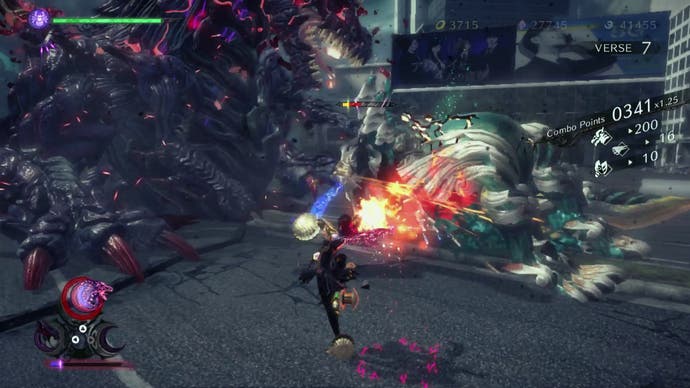
The Demon Slave feature is Bayonetta 3's big new trick, supplanting the Climax Summon and Umbran Climax of previous games and allowing you direct control over the beasts you can summon in action. Their use is managed by a magic meter that is filled up through pulling off combos, and when a beast is summoned it depletes all the quicker if you spam attacks - but in practice you're never too far from being able to call on a colossal ally to help dish out some outrageous levels of damage to the enemies that lie in your path.
And, in practice, it lends a giddy new edge to Bayonetta's combat, taking an over-the-top formula and making it somehow even more outrageous still. In the short section on offer for our preview there are three Demon Slaves to call on (and you can switch between them with three interchangeable slots you can call upon while in battle), starting with kaiju-esque beast Gomorrah who even gets their own kaiju-esque one-on-one encounters as they stomp across the cityscape. Then there's Madama Butterfly, Bayonetta's infernal demon and alter-ego who here enables action scenes that are something like B-movie classic Attack of the 50 Foot Woman, while finally there's the giant spider Phantasmaraneae who allows for some web-slinging combat.
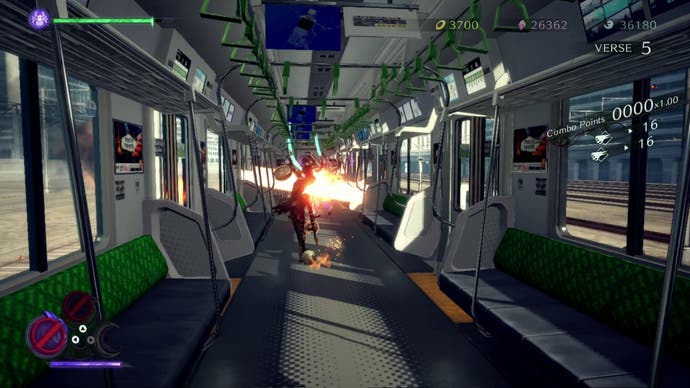
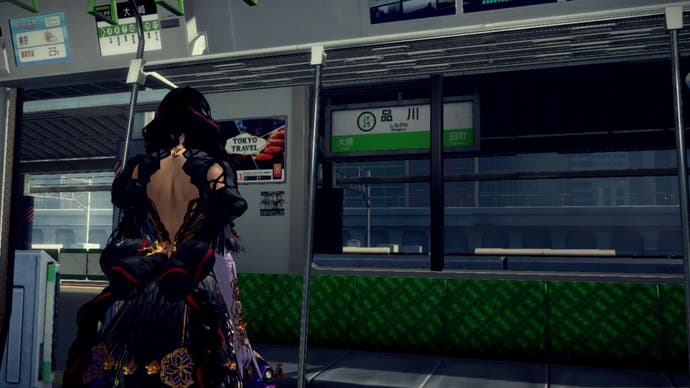
Summons aren't anything new to Bayonetta - indeed, Gomorrah, Madama Butterfly and Phantasmaraneae have all made appearances in previous games - but the way you interact with them is entirely fresh, with the ability to call them up by pressing the left trigger and then have control over them in combat. That system itself isn't entirely new, either, and it feels like Bayonetta 3 has thriftily lifted a core mechanic from a PlatinumGames venture that sadly was never to be.
If Bayonetta's PlatinumGames' most famous export then Scalebound is perhaps its most infamous; an action RPG directed by none other than Hideki Kamiya that was set to be an Xbox exclusive, it did the rounds for several years, making appearances behind closed doors at shows like Tokyo Game Show and Gamescom, before it was cancelled in 2017. I was lucky enough to witness a couple of extended demos, and while I can only speculate as to why it was cancelled - an emphasis on online features, PlatinumGames has suggested in the past, ultimately derailed it - I loved what I saw. This was a meaty spin on PlatinumGames' action formula, built around the unique dynamic between mouthy lead Drew and his dragon partner Thuban who you could direct around the battlefield, stomping and chewing merrily through enemy mobs.
Playing through Bayonetta 3 with its new emphasis on Demon Slave summons those behind-closed-doors demos spring immediately to mind, so it didn't come as too much of a surprise to dig a little deeper and find that Bayonetta 3's director Yusuke Miyata served as a designer on Scalebound. Indeed, given the lingering disappointment that the promising Scalebound never saw the light of day it's a delight to see one of its most interesting ideas salvaged and fleshed out in glorious style for Bayonetta 3 - and who knows, maybe it'll provide fresh impetus to get the aborted project back off the ground again.
It's not the only influence from past PlatinumGames' projects you'll find in Bayonetta 3. Miyata also worked on Astral Chain, the Nintendo Switch exclusive that also boasted quirky interlinked combat of its own, while you'll see other ideas from other games filtering in elsewhere. In a later stage made available for the purposes of this preview we're offered up Viola, a new key supporting character who's also playable for large sections of the game.
Viola's moveset is stripped back, centred around a katana that asks for a more considered brand of combat than Bayonetta's over-the-top excess, and whose rhythm reminded me of Raiden's in the fantastic Metal Gear Rising: Revengeance. To say it's refined might be overstating things a little, though, as Viola has her own spin on the Demon Slave mechanic in her ability to summon Cheshire the cat into battle, enabling preposterous scenes as the grinning feline wrecks through enemy encounters.
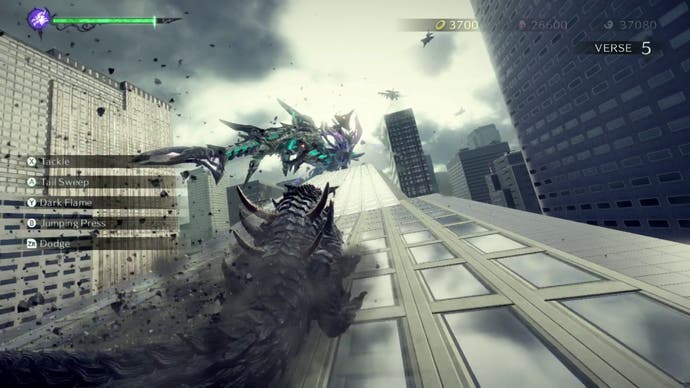
It might all be a bit much if it weren't all delivered with PlatinumGames' trademark energy and style, made all the more enjoyable by the studio's eagerness to one-up itself with each new project. It's been a fair long wait for Bayonetta 3 - some eight years have passed since the second game in the series - and for a while there was some understandable concern about the state of the project.
What a delight to discover, then, that PlatinumGames seems to have spent that time cramming Bayonetta 3 with so much delirious detail that I can't wait to explore more fully. It's a breathless action game that at times feels like the best of PlatinumGames, and one that even finds the space to fold in ideas from projects that never saw the light of day like Scalebound. Right now, there's a decent chance it could well be the very best PlatinumGames title to boot, too.
